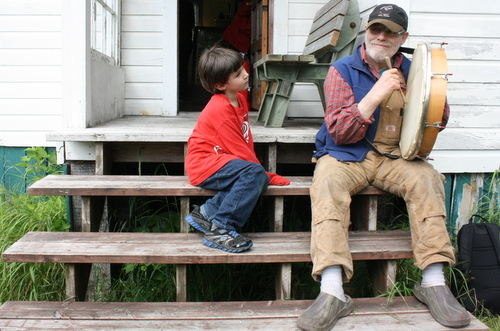This is the second of two parts. Read the previous story in this series by clicking here.

Sage Martin listens to Bud Durdle play the bodhrain, an Irish drum. Durdle, in addition to being a longtime Port Alexander resident, is a Raven Radio volunteer. (KCAW photo by Ed Ronco)
Anita Statter has seen a lot of history in Port Alexander.

Anita Statter came to Port Alexander when she was a little girl in the late 1930s. She says the town has changed a lot over the years. As for the future? “I don’t know,” she says. (KCAW photo by Ed Ronco)
“I was born in 1936, and in the summer of 1937, my mother brought me out here,” she said.
The town she remembers as a girl was a busy place. Fishing boats were coming and going. There were stores for the fleet to resupply. A few other industries, too.
“How do I put it nicely? They had girls of the evening there at the hotel, working,” she said.
The town had stores and restaurants, she adds. Nowadays that’s singular. We’re sitting in front of Port Alexander’s only restaurant — the Problem Corner Cafe. At the moment , it’s hosting a pot-luck to mark the centennial of the southern Baranof Island city.
PHOTO ALBUM: Port Alexander and its people
We asked Statter: In 10 or 20 years, what does Port Alexander look like?
“I don’t know,” she says.
You get that answer a lot in Port Alexander. Ember Livingston runs the cafe. This year, she and her high-school age son moved to Sitka. More opportunities for him there, she said. Activities. Sports. The decision to leave was extremely difficult.

Ember Livingston recently moved to Sitka, but prior to the move, she ran the Problem Corner Cafe. (KCAW photo by Ed Ronco)
“But, you have to do what’s best for your kid,” she said. “There were just opportunities that they don’t have here.”
Schools in Alaska need 10 students to stay open, and Port Alexander comes dangerously close to that threshold on a fairly regular basis. Livingston says they put the move off from last year, when removing her son from P-A would have dropped the school below 10 students.
“I don’t know of anywhere else where the school is truly the center of the community,” Livingston said. “You have every single person there for every single event.”
Pete Mooney agrees with that.
“The school is so important to us that everybody in the community would bend over backward to find housing for a family to keep our school going and do what we could to make their life as pleasant as possible,” he said.
Mooney came to Port Alexander as a teacher. Now, he and his family run the Laughing Raven Lodge.
“I just love the adventure of it. The freedom. The fact that there were no rules,” he said. “You could build a house. Almost all the things we built around here were just built. It’s not like you went to the city council and got a building permit and all that. It’s your land, go ahead and build whatever you want in it. If you can live in it, and it’s OK with everybody else, nobody cares. You could build a paper mache house if you wanted.”
Of course, with that freedom come challenges, too. Port Alexander is off the power grid. There’s no grocery store. The nearest hospital is a float plane ride away. And attracting young families is hard. Not every picture of this place is rosy.

Kevin and Karen Mulligan run the Fisherman’s Inn lodge. Kevin Mulligan was one of P.A.’s homesteaders just a few decades ago. Making a living here is difficult, he says, and he worries about the community’s future. (KCAW photo by Ed Ronco)
“I think that PA’s dying. I really do,” said Kevin Mulligan, one of Port Alexander’s homesteaders, and a pilot who runs the Fisherman’s Inn. “I want to see some growth here. I want to see some families. I want to see a way to make a living here. It’s hard. I’d like to take you on a real walk of Port Alexander, right behind our house, all the lost and broken dreams. Houses that are rotten and falling right into the ground. There’s lots of them.”
He says people came to Port Alexander with a lot of romantic ideas, not realizing how hard it is to make a living there.
“If you’re not comfortable the romance wears off quickly,” Mulligan said. “Not having a flushing toilet, having a dishwasher, laundry. A four-wheeler maybe, just to haul your firewood for you, instead of doing it on a wheelbarrow on a plank.”
Last fall, bears broke into 19 homes and wrecked the interiors while their seasonal residents were away. Life here comes with its own set of challenges.
As someone sets off fireworks in honor of the town’s centennial, Dasha Contag says the challenges of a place like P.A. are part of the reason it should be preserved.
“This is the wild west,” she said. “This is people living by their own means without police, and without all the trappings. There needs to be a place where oddballs and misfits can still show up and feel that sense of family and that awe.”
Contag lives in Port Armstrong, not too far north from Port Alexander. The two communities are intertwined. She says communities like P.A., and the way of life in them, deserve a future.
“This is real life, and true community. It’s worth preserving,” she said. “There are always going to be people that are seeking this.”































